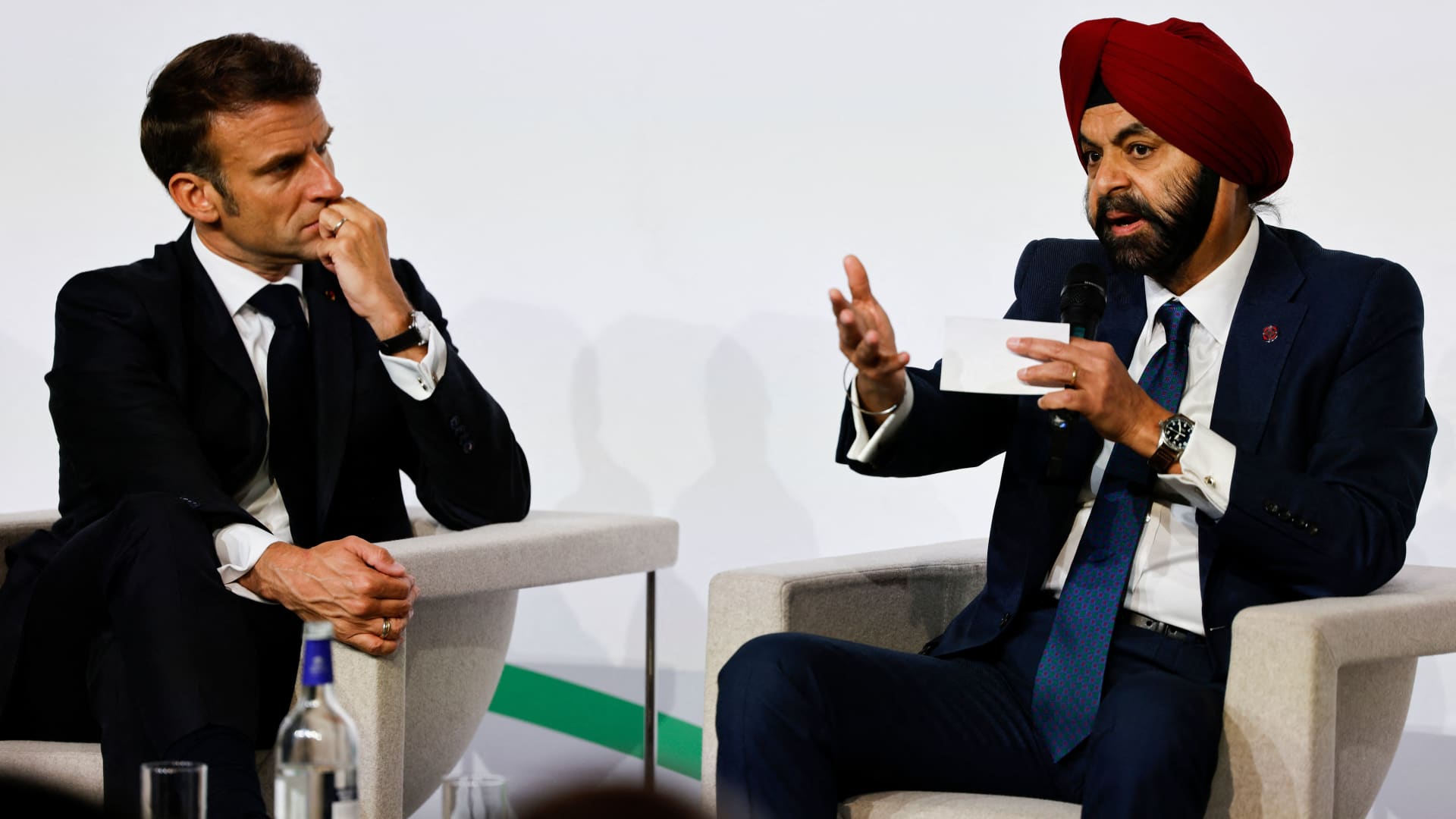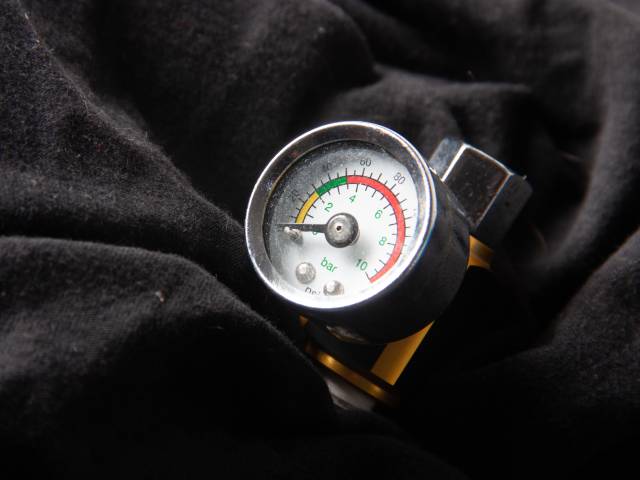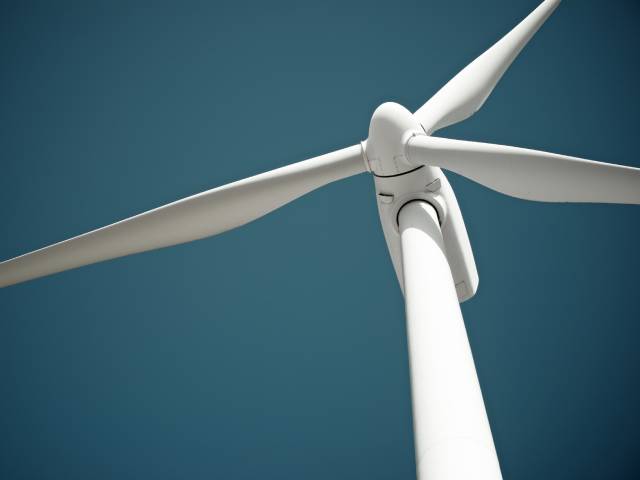

French President Emmanuel Macron (L) looks on as he takes part in a round table discussion next to World Bank President Ajay Banga during the New Global Financial Pact Summit at the Palais Brongniart in Paris on June 22, 2023. (Photo by Ludovic MARIN / POOL / AFP) (Photo by LUDOVIC MARIN/POOL/AFP via Getty Images)
Ludovic Marin | Afp | Getty Images
The World Bank chief announced a raft of measures on Thursday to aid countries hit by natural disasters, including a pause in debt repayments to the lender, at a gathering of world leaders in Paris to give impetus to a new global finance agenda.
Some 40 leaders, including about a dozen from Africa, China’s prime minister and Brazil’s president, were in the French capital alongside international organisations at the “Summit for a New Global Financial Pact”.
It aims to boost crisis financing for low-income countries, reform post-war financial systems and free up funds to tackle climate change by getting top-level consensus on how to promote a number of initiatives struggling in bodies like the G20, COP, IMF-World Bank and United Nations.
“It is clear that the international financial architecture has failed in its mission to provide a global safety net for developing countries,” United Nations Secretary General Antonio Guterres said, calling the system outdated, dysfunctional and unjust.
Leaders are set to back a push for multilateral development banks like the World Bank to put more capital at risk to boost lending, according to a draft summit statement seen by Reuters.
In remarks to a panel on Thursday, new World Bank president Ajay Banga outlined a “toolkit”, including offering a pause in debt repayments, giving countries flexibility to redirect funds for emergency response, providing new types of insurance to help development projects and helping governments build advance-emergency systems.
“We need a robust and predictable financial safety net,” Ethiopian Prime Minister Abiy Ahmed told the conference, calling for a boost to below-market financing and more grants.
“African countries are facing an unprecedented funding squeeze which have aggravated the vulnerabilities,” he said.
While the new World Bank measures are designed to give developing nations some breathing space, there was no discussion of multilateral lenders offering debt writedowns – so-called haircuts.
China – the world’s largest bilateral creditor – has been pushing for lenders like the World Bank or the International Monetary Fund to absorb some of the losses, which the institutions and rich countries oppose.
Citing the war in Ukraine, climate crisis, widening disparity and declining progress, leaders said the World Bank and other multilateral financial institutions needed a new vision.
French President Emmanuel Macron, hosting the summit, said it was time to act or trust would be lost.
The summit aims to create roadmaps for the next 18-24 months, ranging from debt relief to climate finance. Many of the topics on the agenda take up suggestions from a group of developing countries, led by Barbados Prime Minister Mia Mottley, dubbed the “Bridgetown Initiative”.
The coronavirus pandemic pushed many poor countries into debt distress as they were expected to continue servicing their obligations in spite of the massive shock to their finances.
Africa’s debt woes are coupled with the dual challenge faced by some of the world’s poorest countries of tackling the impacts of climate change while adapting to the green transition.
Wealthy nations have yet to come good on climate finance that they promised as part of a past pledge to mobilize $100 billion a year, a key stumbling block at global climate talks.
Though binding decisions are not expected, officials involved in the summit’s planning said some strong commitments should be made about financing poor countries.
Nearly eighty years after the Bretton Woods Agreement created the World Bank and International Monetary Fund (IMF), leaders aim to squeeze more financing from multilateral lenders for the countries that need it most.
In particular, there is expected to be an announcement at the Paris meeting that a $100 billion target has been met for new funds made by rechannelling rich countries’ special drawing rights at the International Monetary Fund to vulnerable countries, officials said.
U.S. Treasury Secretary Janet Yellen, whose country is the World Bank’s biggest shareholder, said multilateral development institutions should become more effective in the way they use their funds before more capital was added.
Some leaders are expected to lend their weight to long-stalled proposals for a levy on shipping industry emissions ahead of a meeting next month of the International Maritime Organization, officials also said.
24World Media does not take any responsibility of the information you see on this page. The content this page contains is from independent third-party content provider. If you have any concerns regarding the content, please free to write us here: contact@24worldmedia.com

Why You Need To Improve Drainage on Your Property

Essential Tips To Shield Your Car Windows From Damage

Warehouse Optimization Tips To Improve Performance

How High-Humidity Climates Affect Pressure Gauges

How Is Global Health Improving Year After Year

Ways That You Can Make Your Land More Useful

Essential Materials Used in the Construction Industry

A Look Into 3 Aspects of Maintaining Wind Turbines

Key Factors To Know Before Using IoT Solutions

Avoiding Hazards: How Vehicle Manufacturers Keep People Safe